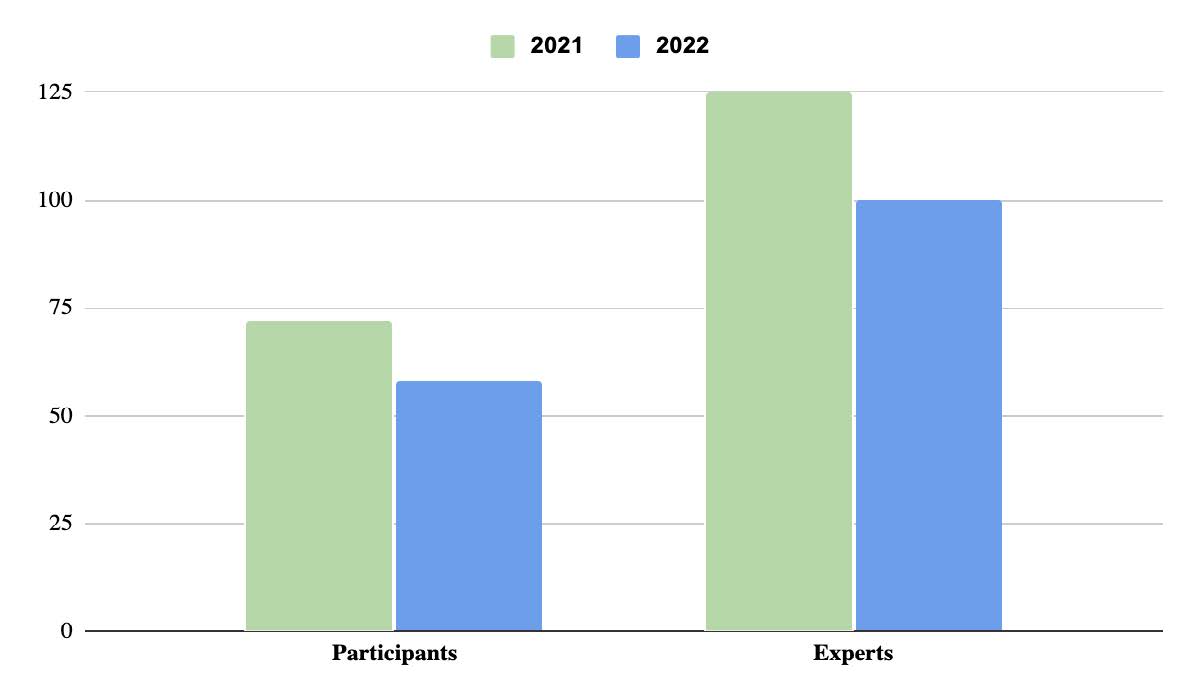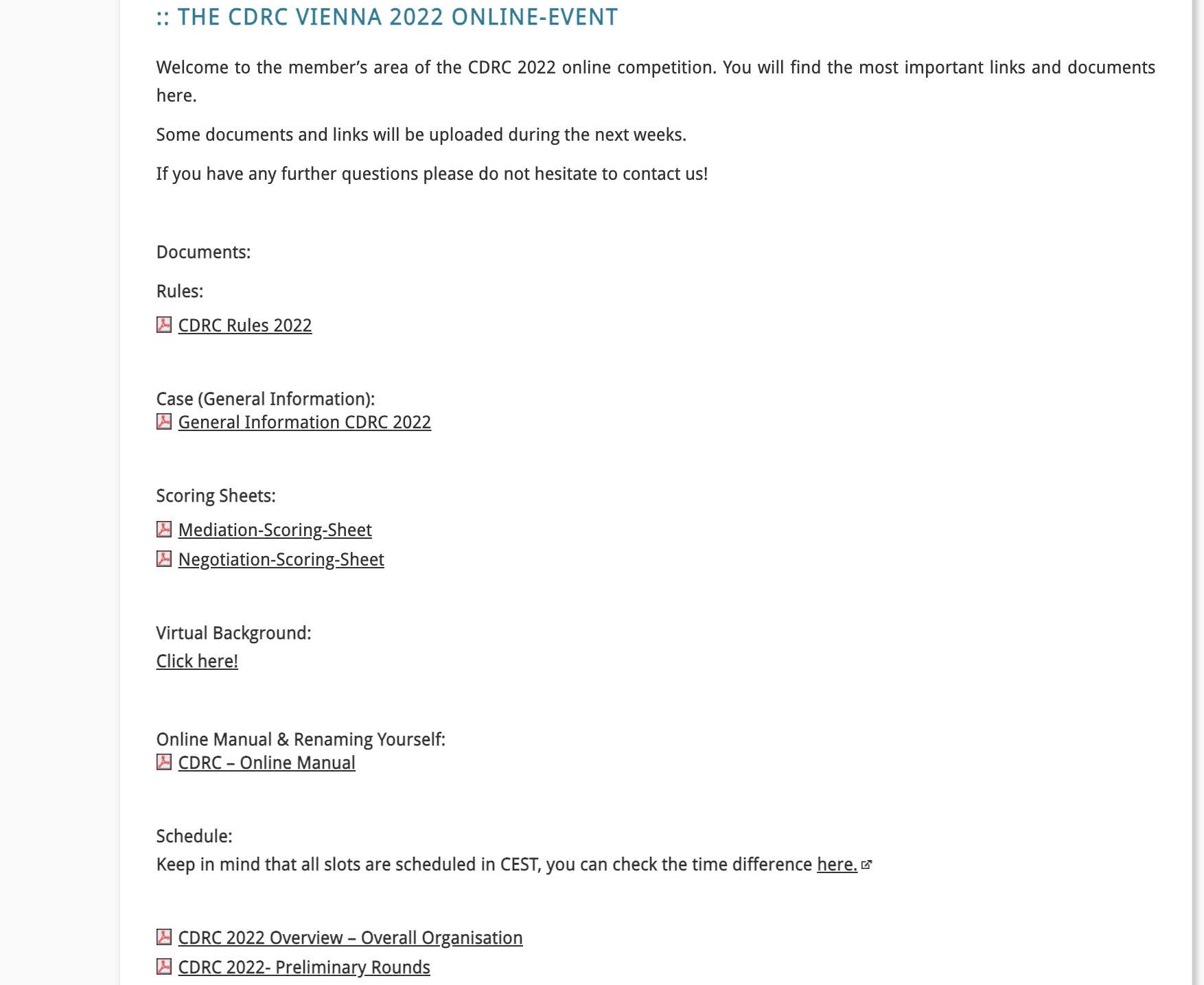Report on the IBA-VIAC Consensual Dispute Resolution Competition 2022
Friday 9 September 2022
Introduction
This report aims to summarise the development of the 2022 edition of the IBA-VIAC CDRC Vienna Mediation and Negotiation Competition. All operative and strategic decisions were taken with a focus on student learning and on increasing the benefit for the participating students. Due to the Covid-19 pandemic and developments in Ukraine, the competition was held online for the second consecutive year.
Applications

As the competition is an online competition, accessibility was increased for a larger range of possible applicants. Although the number of applications fell due to an increase in online fatigue, the range of countries represented increased. This is because online competitions are cheaper and more accessible than the competition taking place ‘in person’ in Vienna.
Feedback from participants however was a preference for ‘in person’ competitions. However, as the online competition had the advantage of easier access to the target group it also had disadvantages. Networking and social integration are not as pronounced.
As the application process is highly competitive, those teams who could not be retained for the competition, were offered - with the generous help and support of Katja Kröll and Natascha Tunkel - the ‘IBA VIAC CDRC Mediation Masterclass'.
This was offered for the second year in a row. During this two-day workshop, all applicants who could not participate in the competition had the opportunity to learn and improve their dispute resolution and mediation skills.
The 2022 competition was delighted to host a variety of universities from all over the world.
Participating universities
Mediator teams
- Asia Pacific Institute of Information Technology (APIIT) Law School
- Charles University – Faculty of Law
- Federal University of Espírito Santo (UFES)
- KU Leuven*
- NALSAR University of Law, Hyderabad
- National Law University Delhi
- Pontifical Catholic University of São Paulo (PUC-SP)
- Rajiv Gandhi National University of Law*
- The University of Sydney
- University of Miskolc (UoM) Faculty of Law*
- University of Vienna
Negotiator teams
- Asia Pacific Institute of Information Technology (APIIT)
- Charles University - Faculty of Law
- Federal University of Rio Grande do Sul (UFRGS)
- Hidayatullah National Law University, Raipur, India
- Jagiellonian University
- Leibniz Universität Hannover
- Maastricht University*
- National Law Institute University, Bhopal
- National Law University, Delhi
*New participants at CDRC
Four new universities were welcomed to the competition. It is expected that the competition will continue to grow and to expand to new universities worldwide.
Winning teams
Negotiation
|
Award
|
University
|
|
First prize
|
University of Sao Paulo
|
| Second prize | Singapore Management University |
| Third prize | Asia Pacific Institute of Information Technology |
| Special Award for Best Negotiation Strategy | Maastricht University |
| Special Award for Best Advocacy | Pontifical Catholic University of São Paulo |
| Special Award for Best Teamwork | Federal University of Rio Grande do Sul |
Mediation
|
Award
|
University
|
|
First prize
|
Asia Pacific Institute of Information Technology
|
| Second prize | University of Vienna |
| CAM-CCBC Special Award for Best Mediation Management | University of Sydney |
| Special Award for Most Effective Opening Address | KU Leuven |
Volunteers
The IBA-VIAC CDRC Vienna Mediation and Negotiation Competition is operationally run by the directors, who are supported by volunteers during the competition.
The volunteers need to apply online and are selected by criteria such as mediation knowledge, technical knowledge (especially Zoom), and competition experience. The directors engaged 20 volunteers from all over the world for this year's competition. The number of volunteer applications grew to 38. This growth is probably explained by the format as an online competition.
Experts
The directors faced huge difficulties this year in nominating a sufficient number of expert assessors as a significant number of experts dropped out (in some cases spontaneously). This led to insecurity during the competition which was sorted out via the personal contact of the co-directors. A promising development is that a number of experts joined CDRC in different roles (volunteers, participants, coaches). This is a result of relationship-building from previous years and the work of the directors and the whole team. During the competition, all experts pointed out the special atmosphere of trust and collaboration built during this and previous competitions. It is expected that most of the experts will re-apply for the next editions, which gives CDRC the possibility to develop a continuous pool of experts with diverse backgrounds.
Sponsorship
The competition is financially based on two pillars: the registration fees and the incoming sponsorship. Registration fees are kept at a minimum to allow as many teams to compete as possible. The workshops provided prior to and during the competition are provided pro bono. As the world is still suffering under Covid-19 and the marketing budgets for sponsorship have been reduced, the available funds are limited. Therefore, the sponsorship situation is tense.
As the fundraising became difficult, all members from IBA and VIAC of the organising committee agreed on their individual support in this matter. This support was financial and also via their network. Due to the unforeseeable pandemic situation, further online competitions are still possible. Sponsorship is integral to the holding of this competition.
It is to be noted that the IBA and VIAC are the major sponsors of the competition.
Online competition experience

The 2022 competition took place virtually. The format was chosen, as mentioned earlier, due to the Covid-19 pandemic. Zoom was used as the platform for the rounds as all participants are familiar with Zoom (Zoom has a market share of roughly 48 per cent). To ensure that all participants and experts are aware of the schedule and have the possibility to ask questions, a common room was established. This room was used for information purposes, for announcements and as a mingling place. In addition to that, the team established 'Wonder.me' as an informal and easy-to-use platform. This helped the participants to use the time in between the rounds to meet new people or to obtain further feedback. To enhance the online experience the co-directors strengthened the member area of the website. Previously, the website was used as an information resource.
After the rework, the website was used as an information and link hub.
Due to this change, all participants had a clear overview of all required information. Furthermore, it was possible to link on the website to the confidential scenarios for the mediations (only for experts). Also, all experts could act as a reserve judge, if required. This development stabilised the running of the competition, which was previously a huge challenge and this mitigated the online fatigue of students and experts.
Online visibility
Visibility is one of the biggest challenges in online competitions due to the now vast number of different competitions worldwide.
CDRC achieved 35,202 pageviews and nearly 15,000 unique pageviews. If one compares this number in relation to the number of participants (approx. 300) it clearly demonstrates that IBA-VIAC CDRC significantly extended the brand in 2022.
At the opening of the IBA-VIAC CDRC competition and of the masterclass, officers from the IBA Mediation Committee addressed the students, explained the aims of the IBA and informed them about the special IBA student membership rate. This year, Peter Bartlett, IBA Legal Practice Division Chair, kindly addressed the students with a special message.
Feedback
The feedback was generally very positive. The majority of participants were pleased by the high quality of the organisation. The technical aspect was quite stable and none of the participants faced a complicated or a delayed rectification of a technical issue. The previously trained volunteers were capable of dealing with all technical questions. The information flow for the experts can be improved for future competitions. The major challenge for the 2022 edition was the dropping out of a number of experts, however the challenge of time differences was met as the session times were scheduled focusing on the feasibility of time differences. Another improvement was the integration of a time converter and clear communication. It is hoped that the IBA-VIAC CDRC Competition will be held ‘in person’ in Vienna in 2023. Noting that online fatigue is now a challenge, all participants and experts have expressed the view that, if possible, an offline CDRC competition be held in the future. There is great interest in the continuation of the competition.
The Operating Committee thanks the directors, experts, coaches, volunteers, students, sponsors and IBA and VIAC for their commitment to the competition.